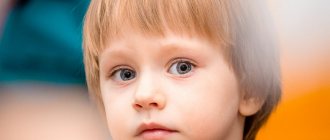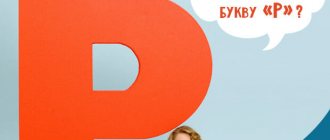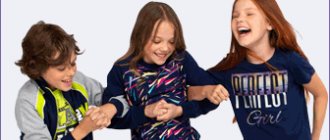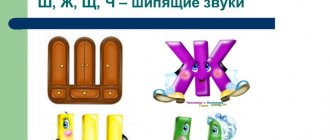Good day everyone! Today I want to talk about a very serious topic, like speech therapy classes with children aged 5-7 years. After all, many people attribute incorrect sound pronunciation to age. It will outgrow, we think. But things may turn out differently. Do you know about the troubles that lead to clumsy speech in an adult?
First of all, this is a huge lack of confidence in oneself and one’s strengths. Just imagine! Such a complex will create problems anywhere! From finding a good job to success in your personal life. Let's correct the children's incorrect pronunciation before it's too late! We will study a number of interesting games and activities on the most common situations. Let's get started!
Types of defects
I propose to begin by considering the types of speech disorders. There are many of them, but each child has his own.
- Stuttering. This is a fairly common phenomenon. You can notice it around the age of 3, at which time the first sentences begin to form. It is important to immediately contact a good speech therapist. After all, no specialist can guarantee that in a couple of years the problem will not return again...
- Dislalia. The word is very clever! But behind this lies another common problem for preschool children - incorrect pronunciation of consonant sounds. This is especially true for “R”, “L” and “W”.
- Nasality. Here, of course, the main role is played by the natural factor - the incorrect structure of the speech apparatus. And it would be very good to visit an otolaryngologist to solve this problem.
- General speech underdevelopment (GSD). Here, dear readers, close relatives of the baby are often the culprits. Various kinds of baby talk and insufficient communication lead to the child constantly confusing everything. I'm talking about endings in words, confusing prepositions, etc. This can have a bad effect later. After all, school is coming soon!
- Congenital pathologies of a neurological nature. Complex treatment from a neurologist is already required.
- With delayed speech development (SDD). This usually manifests itself around the age of 3. After all, at this time children babble non-stop! Therefore, if you have a short vocabulary, contact a specialist without delay!
Pay proper attention to your little one. Monitor your child's speech. And in case of gaps, seek help from a doctor!
Pure talk
They are also necessary for the development of the baby’s speech. Pure sayings, like poems, should be short and easy to remember:
- “Oh-oh-oh – our cat isn’t so bad.”
- “Uh-uh-uh - our rooster crowed.”
- "Ah-ah-ah - we are standing on our feet."
- “Sha-sha-sha – mom’s noodles turned out delicious.”
- “Shu-shu-shu - I’ll ask daddy.”
- “Shi-shi-shi - how the reeds rustled.”
You can come up with such pure sayings yourself. It all depends on which letters the baby cannot pronounce.
When should I take my child to a speech therapist?
I don’t even know why, but today the number of children with problems with sound pronunciation has increased sharply. Tell me, how much time a day do you devote to reading, and how much to watching TV together? One of the reasons I see is the global interest of children (almost from the cradle) in technical means. The children communicate little. There is no desire for this. What for? After all, there are so many interesting things around, and they are concentrated in one place: on TV.
As a result, we ourselves may miss that golden moment to send our child to a specialist. Speech therapists have an unspoken rule: the sooner, the better. That's right, this should be resolved immediately. Sorry for the comparison, but if you stain a dress and leave it for a long time without washing, what will happen? Of course, there is a risk that the stain will set in and not wash off. So it is here.
Speech therapy classes for children - we do them at home.
The peak of visits occurs for children 4 - 5 years old. Right now they must pronounce complex consonants and construct sentences with logic. More precisely, even texts involving elementary words. There must be consistency in his stories. Do a test by asking your child to retell a simple picture. Did not work out? Then see a specialist!
When an accurate diagnosis is made, you will begin to attend classes that are sure to give results. But don’t be lazy at home either, practice in a playful way, at least for 20 minutes. Just don’t force it, kids don’t like it! And I’ll tell you what exercises you can do at home, depending on the problem.
Logorhythmics
Such activities help children not only master speech, but also expand their vocabulary. Speech therapy rhythms develop a child’s motor skills, speech, thinking, memory, and attention. Exercises are given to children from two years old. When your child speaks poorly, let him repeat only what he remembers. If he does not speak at all, then the adult sings, and at this time the child’s hearing develops and his speech reserve is replenished.
Speech therapy classes for children 2-3 years old are interesting and exciting. When you start singing and doing the exercise, the child will become interested, and he will involuntarily begin to repeat after you. There are several exciting games:
- "For a walk". You need to read aloud a verse to which the baby repeats certain movements:
Our legs (stretches palms to legs)
walk along the path (slaps hands on knees).
Over bumps, and over bumps (moves in slow steps)
all the flowers step over (raises his legs high).
- Game "Weather". The child sits on a high chair and listens to slow music. When you say, “It’s raining,” he pats his knees with his palms in rhythm. Hearing the words: “Lightning has appeared,” the baby rings the bell. When you said: “Thunder is thundering,” the child stomps his feet loudly. When the word “silence” is said, the baby becomes silent and sits motionless for a minute.
- Do exercises, saying: “First, we raise our handles “one-two-three”, then we lower our handles. We'll stomp our feet, clap our hands, jump, run, and we'll finish our exercises. And we will begin to walk quietly again.”
These are interesting speech therapy classes for children 2-3 years old. Exercises should be carried out only with musical accompaniment. Then the child will really like such activities, and he will please you with his successes.
For pronunciation of sounds
Those who have already encountered this side of the coin know that the most insidious sounds are R, L and Sh. If the child simply does not pronounce them (losing them in the word), the time has not come yet. And when he begins to pronounce other, simpler letters instead of them, it’s a reason to think.
Here are a few exercises for you to take note of. They are of an articulatory nature, for the correct formation of the uvula, palate, and lips. In general, the entire articulatory apparatus.
Let's learn to say R clearly! I really like these events:
- Open your mouth wide and smile. The lower jaw is motionless, and the tip of the tongue is raised up, as if stroking the palate back and forth. Recommendation: do it yourself first so you understand the principle. This way, it will be easier to convey the essence to the child!
- We brush our teeth with the tip of our tongue from the inside. The mouth is wide open. See how simple it is! A five-year-old child can do it without difficulty.
- And another interesting option. Place a small ball on a wooden stick, the child opens his mouth and says DDRRR. At this time, you move this tool under your tongue. Movements must be made quickly.
- Ask to say “YES”, while letting the tongue rest against the teeth. “YES” - in the upper palate.
Watching this video will help you pronounce the sound “R”.
Learning to pronounce L:
- Open your mouth wide, place your tongue on your lower lip, holding your chin, pronounce La, Lo, Li, Lu.
- Run your tongue across the roof of your mouth as if we were painting it.
- And let him try to touch the tip of his nose with his tongue.
- We lick the imaginary jam from our lips.
Now the problematic letter Ш:
- Insert the tip of your tongue under your upper lip and tear it off sharply with a click.
- The lips should be rounded, pulling them forward. Hold this for 6 seconds.
- Take a piece of cotton wool and place it on your baby's nose. And let him try to blow it away so that it flies upward. This is a fun exercise that your child will definitely appreciate.
Here is a selection for every day, for clear speech pronunciation.
What is speech therapy and what are its methods?
Speech therapy literally translated from Greek means “speech education.” To summarize, we can say that this is the science of the development of speech skills, the causes, mechanisms, symptoms of speech disorders and methods of their prevention and correction.
There are many tools in the arsenal of speech therapy. Among them:
- articulation gymnastics;
- activities to develop fine motor skills;
- exercises on onomatopoeia, hearing development, logorhythmics;
- repeated repetition of verbal constructions;
- breathing exercises and voice exercises;
- exercises for individual sounds.
In each specific case, the methods are individual. The tasks are different - to prevent, correct, restore, but the goal of the classes is one - correct-sounding speech.
In a broader sense, the goal of speech therapy is to educate a person with speech disorders and help him with social adaptation.
Now let's move on to the description of speech therapy exercises.
Learning to speak clearly
At 5 - 7 years old, a child is already able to repeat many exercises after a parent or teacher. But among them there are also complex ones. I tried to put together the simplest and most effective ones. By the way, they are also perfect for children with special needs.
Articulation gymnastics
- Smile so that your teeth are visible. And then we pull the sponges into a tube.
- Tighten your lips as hard as possible. Gently relax.
- Bite your upper and lower lips alternately with your teeth.
- Clattering of hooves. This is a well-known action. The kids will love it without a doubt!
15 minutes is enough time. By the way, such corrective manipulations are perfect not only for children, but also for any people with problems with sound pronunciation.
OLYMPUS DIGITAL CAMERA
Here are a few more examples of correcting the development of speech formation:
- Everyone knows how babies cry? So let's play this sound: Wah, Wah.
- Let's squeak like little mice: Pi, Pi.
- How loud do we make when we get lost in the forest? Ay, ay!
- A strong wind howled: UUUU.
- And now a combination of vowels and consonants. Imitation of animal calls: Meow, Mu, Kwa, Ko-Ko, Ga-Ga.
- The bear growls: RRR.
- We sing in a little voice: La-la, la-la-la.
Singing, by the way, is very useful. Choose a song that your child likes. Perhaps timed to coincide with the nearest holiday. They also like “Two cheerful geese lived with grandma,” “There was a birch tree in the field.” At first glance, they are simple, but the words flow smoothly, which is very important for corrective work. By the way, kindergarten teachers use this. There are definitely music lessons there. But developmental activities with a speech therapist are also present there.
Find out a list of books and albums on speech development.
Rules for speech therapy classes at home
The success of home lessons depends not only on the availability of the necessary aids and a work plan agreed upon with the speech therapist. The organization of classes itself is very important. Here are a few simple rules that will help you achieve excellent results:
- All speech therapy exercises for children should be carried out regularly, but a little at a time. You shouldn’t try to do articulation gymnastics, play speech games, or fill out a workbook right away. It is better to devote a few minutes to each type of exercise, rather than having a whole “speech therapy day.”
- Do not force them to complete tasks under pressure; educational activities for children should resemble a game. Come up with a simple plot (for example, a journey into the universe of sounds), prepare small prizes (stickers, paper stars), and arrange physical exercises.
- Praise and support the little student if he makes even the slightest progress. Focus on achievements, even small ones, gradually progress will become more and more obvious.
- Find good workbooks for home practice. They should not only be professional in content, but also bright, colorful, and exciting. It is ideal if the tasks have interactive elements (the opportunity to add something, draw something). Such material makes it possible to interest a preschooler and clearly shows him the “path traveled” and success.
- Don't expect instant results, be patient and gentle perseverance. The process of setting, consolidating, and differentiating sounds is complex; it takes months even for experienced speech therapists. Follow the plan and the results will gradually appear.
Kindergarten classes
Tell me, does your child attend kindergarten? If so, how are speech therapy classes conducted there? In the garden where our Dominic goes, there are 2 types:
- Individual. When a child has a certain problem.
- Group (frontal). A group of children with similar defects gathers.
Ideally, this should be the case in all preschool institutions. But 5 - 7 years old, this is already a preparatory group. After all, school is coming soon! What activities are good here? One of these is chants. And these are not simple songs, as you might think. This is singing and performing certain actions simultaneously.
Here is the simplest option: “the plane is flying.” Children sing to the melody of UUUUU, arms should be spread like wings. The teacher guides their actions:
- We hum at different volumes (the plane flies further, then flies closer).
- Broken. When making the sound UUUU, the children hit themselves in the chest with the palm of their hand.
- We're landing. Performing UUUU, spreading their wings, the children each run to their own chair.
The manipulations with the microphone are very interesting. The kids hear their voice, and at the same time they either move the microphone away or bring it closer to themselves.
There are, of course, a lot of troubles. But now, most of them are solvable. Even those called ZPR or ZPRR.
Warm-up: finger games
Few people believe that fine motor skills develop speech. However, this is scientifically proven. Therefore, try to pay attention to finger games. Here are some examples:
- Place your thumb and index finger together. Let the rest be raised and spread out. Show the children this cockerel, saying: “Our Petya the Cockerel, the golden comb, went to the market and bought one boot.”
- Close your thumb and index fingers and tap them on the table. At this time, say: “The chicken came and found a grain, did not eat it herself, but took it to the children.”
- Close the thumb with the two middle fingers, and simply bend the little finger and index finger slightly, saying: “The mouse is gnawing on the dryers, the cat has come, the mouse has crawled into a hole.”
- Bend your phalanges in different directions, saying: “Our fingers are very friendly, everyone needs them. We need to count the brothers, there are five of them on one hand. There are no less of them on the second, they are all good, because my fingers.”
Finger gymnastics is a warm-up that every child needs to get him interested in a further lesson. After all, speech therapy classes for children require perseverance. 2-3 years is the age of fidgets. Therefore, we first interest the baby, and then we begin the exercise.
A diagnosis of mental retardation is not a death sentence
There are parents who imagine and invent defects for their child. It’s not for nothing that people say: “It’s better to be safe than sorry.” But there are those who point blank see nothing wrong. But by the age of 5, a child should already be able to express his thoughts in understandable phrases. Do not confuse syllables in words.
There are several diagnoses that baffle parents.
- ZRR. When only the word pronunciation is underdeveloped, but mentally the child is fine. It’s good if it is detected before 4–5 years of age, since then another stage begins: zprr.
- ZPRR delayed psycho-speech development. When the child’s psyche and mental abilities are also involved in the process.
- ZPR is just mental development. The speech apparatus also suffers, but the basis here is the baby’s psyche.
I will not talk about the reasons that prompt such states. But, if this happened, then the rule of speech therapists (and all other doctors!) is observed here. And it says: “The sooner the better.” I hope you understand that, as with any disease, there are more complex forms.
Be sure to find a good specialist who will find a common language with the baby. Most likely, a neurologist should also be involved here. But first of all, maintain a good emotional background at home. Believe me, a lot depends on this. Well, now I’ll write recommendations for exercises with mental retardation.
In what cases should you visit a specialist?
There are several signs that indicate your child's speech needs professional help:
- very poor vocabulary;
- inability to correctly pronounce a large number of sounds;
- incorrect choice of word, lack of correlation between the word and the object to which it refers;
- constant omission of some syllables in words;
- slow or, on the contrary, very fast speech, pronouncing most words in syllables;
- slurred speech, stuttering;
- constant hesitations and pauses.
In these cases, it is necessary to show the child to a speech therapist, possibly a neurologist, as quickly as possible, this will help identify the causes of the disorders and eliminate them.
Literature
If there are any defects in sound pronunciation, you need to have the right books at home. They are compiled by competent authors. And in combination with visits to speech therapy lessons, they will definitely help you cope!
- “Speech therapy homework for children 5-7 years old with OHP” Teremkova N.E. This is album No. 1, there are 4 of them in total. And each is dedicated to certain lexical topics.
- “Speech therapy group: play sessions with children aged 5-7 years” Derbina A.I. The best way to get your child interested in learning is to play with him. This manual is built in a playful form. And it is intended for children with complex defects.
- “Speech therapist lessons. Games for speech development” Kosinova E.M. As you can see, everything here is also built on game elements. What I liked is that the benefit is suitable for 6 months to 6 years! And here you can find both finger games and material on articulatory gymnastics.
- “Encrypted tongue twisters. Sweetie" Kodolbenko E.A. Do you remember from childhood: “Sasha walked along the highway and sucked on a dryer”? Here is a very similar guide, with funny sayings that will appeal to the little reader.
- “Fun Logorhythmics” by E. Zheleznova. This is an audio tutorial. Anything can be invented to interest a child! But the main thing is that it really is beneficial! Funny poems for the development of speech and attention, exercises for gross motor skills and rhythm.
You may be interested in reading books for children from 5 to 8 years old: a list of the 40 most interesting books by year.
I hope these manuals will become your real helpers for homework with little fidgets. Tell us, what measures to eliminate speech defects do you know? How do you work out? What are you reading for this? Share your experience by leaving comments. And subscribe to blog updates! See you soon. Bye!
Typical speech disorders in children 5-6 years old
Most older preschoolers have difficulties with:
- mastering sonorous and hissing sounds;
- sound analysis of words;
- development of narrative speech;
- writing a story and descriptions.
Of course, such problems can be minor, only slightly different from the age norm, or serious, up to and including general speech underdevelopment (GSD). It is necessary to contact a speech therapist in any case, but the supportive work of parents at home is also very important.
It is worth noting that regular speech therapy exercises and classes for children 5-6 years old are useful for every child at home, because they help to master literacy faster.
Advice from speech therapists
Nowadays, it is very common to find non-speaking children aged 2-3 years. This does not mean that the child has speech problems. Speech therapists say that there is no need to worry until the age of three. However, speech therapy classes for children still wouldn’t hurt. 2-3 years is an inquisitive age, so kids will be happy to exercise if they are interested.
The first few lessons should last no more than 3 minutes. Then you can gradually increase the time. It is important that the baby likes it. If you see that your child is tired and doesn’t want to study, don’t force him. Postpone the exercises until your baby is in the mood for exercise.
It's better to exercise a little every day. Then the baby develops skills, habits and memory. Don't scold him for incorrect movements and pronunciation. Remember, your baby is just learning. Don't discourage him from studying. After all, if you scold and punish, then nothing good will come of it.











